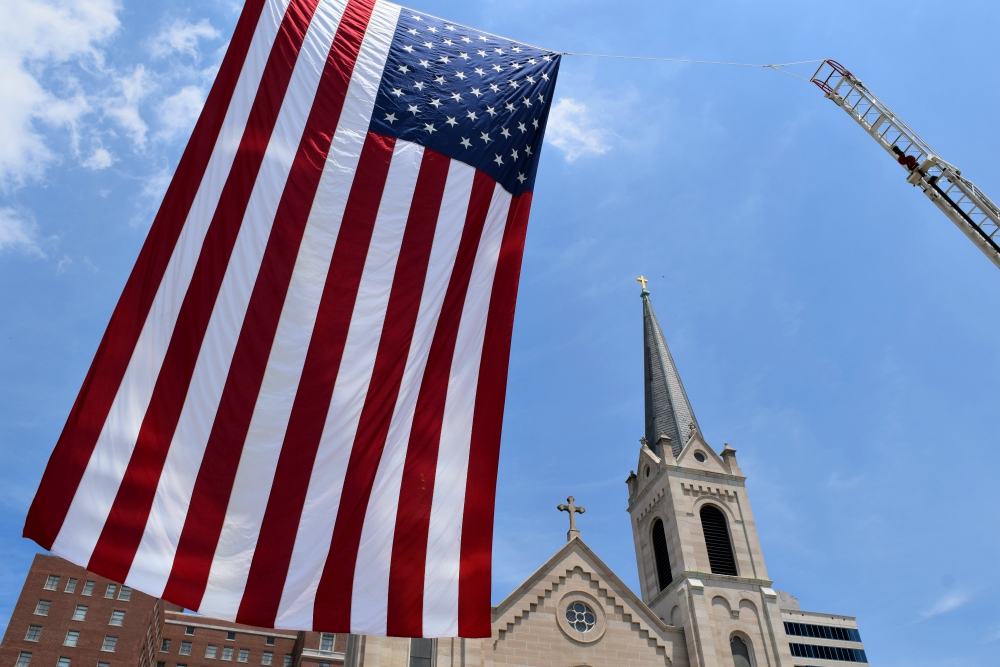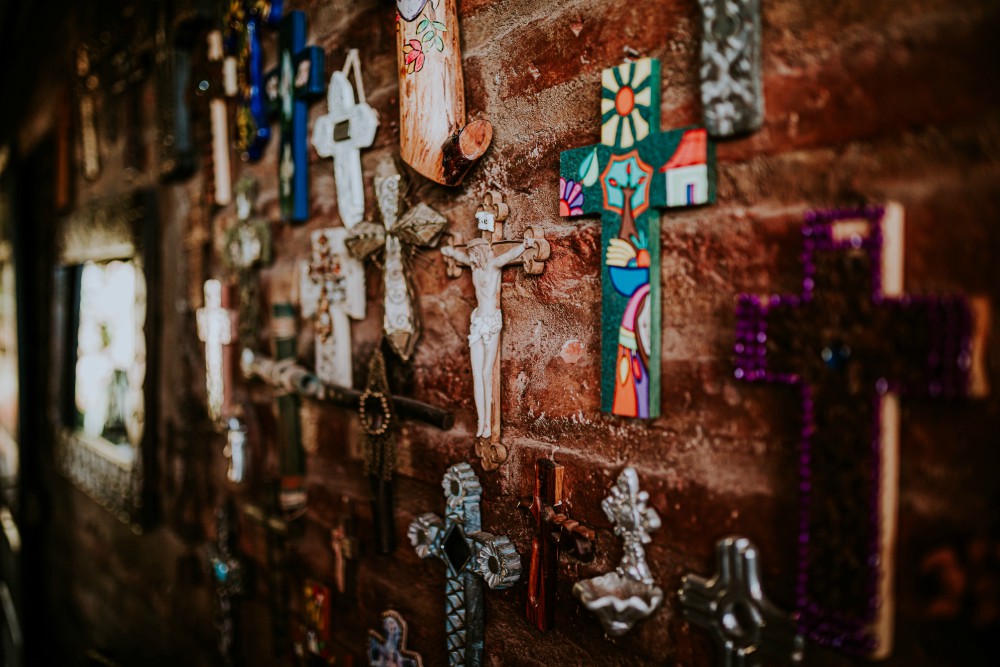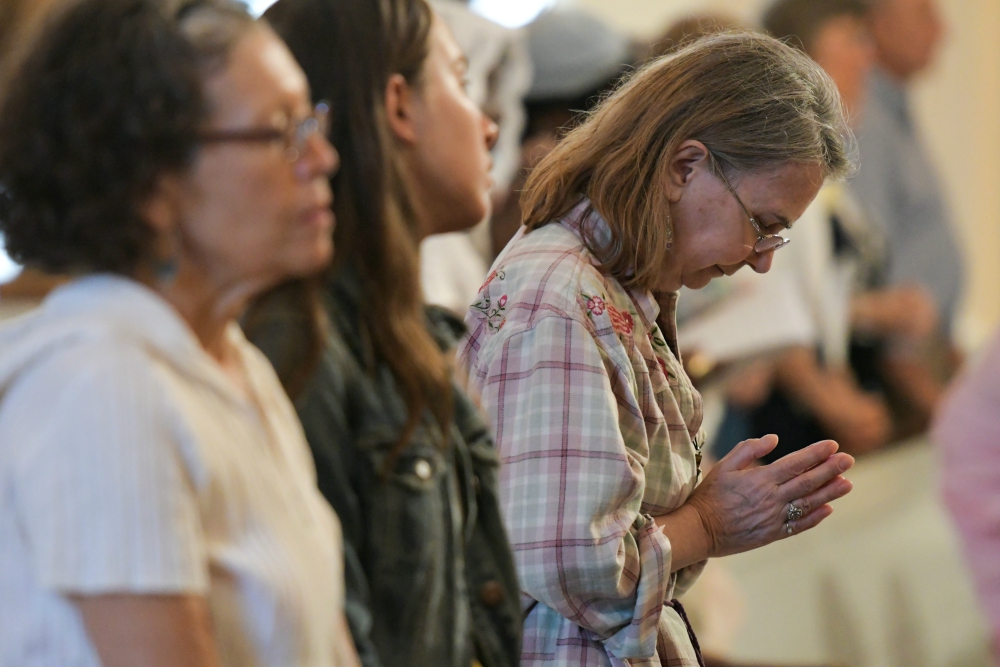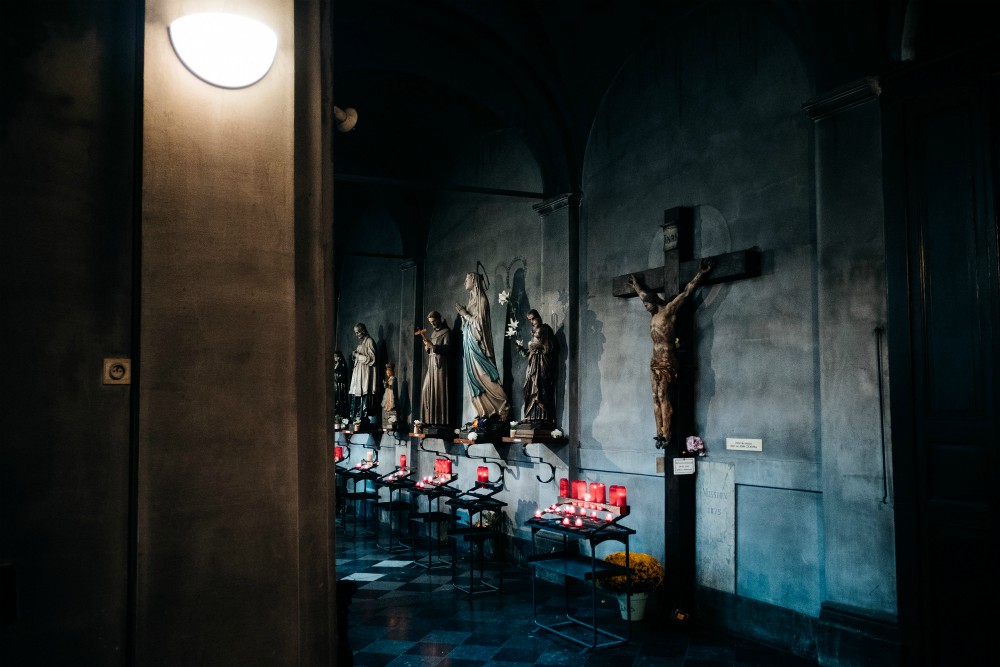
A 48-foot U.S. flag is seen June 24, 2016, outside Sacred Heart Church in downtown Peoria, Illinois. (CNS/Catholic Post/Tom Dermody)
Jesus wandered in the desert for 40 days and the Israelites for 40 years! I have only made you, dear reader, wander through H. Richard Niebuhr for four days. What can we now say having made the trek? Are there any clamant conclusions? Any contemporary applications that would have escaped Niebuhr because of the time in which he wrote compared to our own?
Let us start with his conclusion which, in turn, starts as a non-conclusion:
Yet one is stopped at one point or another from making the attempt to give a final answer, not only by the evident paucity of one's historical knowledge, as compared with some other historical men, and the evident weakness of one's ability in conceptual construction, as compared with other thinkers, but by the conviction, the knowledge, that the giving of such an answer by any finite mind, to which any measure of limited and little faith has been granted, would be an act of usurpation of the Lordship of Christ which at the same time would involve doing violence to the liberty of Christian men and to the unconcluded history of the church in culture. If we should make such an attempt we should need to assume that our particular place in the church and history is so final that we can hear not only the word of God addressed to us but His whole word [p. 232].
In a word, our decisions in faith "are made, it appears, on the basis of relative insights and faith, but they are not relativistic." Yes, our knowledge and experience are partial. "Our solutions and decisions are relative, [also] because they are related to the fragmentary and frail measure of our faith" (p. 235).
As well, not only our place in history, but our duties in the social structure are relative: "A great and powerful church cannot responsibly do what a small and persecuted sect found to be required of it" (p. 236).
Lastly, "there is a relativity of values that we must take into account in all our choices. Everything with which we deal has many value relations; it has value for ourselves, for other men, for life, for reason, for the state, and so on. … Priest, Levite, and Samaritan must be considered equal in value as objects of divine valuation; but they are not equal in value to the victim of the robbers, quite apart from anything he thinks about them" (p. 237).
This relativity of our situation, however, is balanced by the God revealed to us. "If we have no faith in the absolute faithfulness of God-in-Christ, it will doubtless be difficult for us to discern the relativity of our faith," Niebuhr correctly observes. "Because that faith is weak, therefore we shall always endeavor to make our personal or our social faith into an absolute" (p. 239). There is no compromise here: "One cannot compromise among incommensurable interests and values; and an absolute standard cannot be compromised — it can only be broken" (p. 241).
What started then with an admittance that we cannot attain any final answers ends with a precise conclusion: All our human deeds and thoughts are relative, but they are not relativistic because God is faithful and his faithfulness is absolute.
Niebuhr's conclusion, which is a conclusion from the starting point, is more simply stated:
The existential problem, stated in despair or in faith, cannot be phrased simply in terms of the "I." We are involved, and every "I" confronts its destiny in our salvation or damnation. What will become of us? What is our whence and whither? What is the meaning — if meaning there is — in this whole march of mankind with which I am marching? ... It is not in lonely internal debate but in the living dialogue of the self with other selves that we can come to the point where we can make a decision and say, "Whatever may be the duty of other men, this is my duty," or, "Whatever others do, this is what I must do."
We do not confront, and we are not confronted by, Christ alone, but among a great arc of discipleship. We are not Christians because we happen to have been born in a place where there were Bibles lying about. The church exists in the heart of every Christian. "What would I know of Him, but for her?" asked the great French theologian Henri de Lubac.
I agree with both of those conclusions that Niebuhr draws and I would draw a few others that reflect the difference in time and cultural circumstances that have passed. Before doing so, let me remind the reader that I am so far above my pay grade at this point, my vertigo has kicked in. When I speak on a college campus, I like to start by reminding the audience, "I am not a theologian. I only pretend to be one on the internet." I repeat that reminder again here and now. Nonetheless, a friend wrote to say that this book "serves as an examination of conscience for us as individuals and as a community." In that spirit, I share the initial results from my own examination.
First, it is not only that each of the five resolutions of the Christ and culture problem are different, it is that all are necessary to the life of the church, maybe even to the life of the Christian. There are times and circumstances when we must invoke Christ as our ally to confront and denounce the culture, when we are right to separate ourselves from it, just as we will be using the language and the lore our culture gave us to make our stance.

(Unsplash/Omar Rodriguez)
There are moments when dualism seems an appropriate response, yet it was not enough to say, with St. Paul, that there be neither slave nor free in Christ (Galatians 3:28) when the kingdom (and Dr. Martin Luther King!) demanded God's justice and God's justice demanded that there be neither slave nor free, period. Where would theology be without the strong anchor of Aquinas? But an anchor is only one symbol of faith. The descending dove is another. So, too, is the wind rustling through the leaves.
This leads me to the second conclusion. It is time to abandon all common ground initiatives of any sort. They misframe the problem. The challenge for our divided church today is not to find some elusive common ground, which, in the nature of the thing, will be thin and unsatisfying. Better to ask ourselves what those who view the relationship of Christ and culture differently from the way I do bring to the life of faith, and how my own faith, and the life of the church, might be strengthened if we learn to acknowledge each other's gifts and perspectives rather than convince each other that our way is the more faithful.
Far be it from a controversialist like myself to eschew debate and dialogue. I am not saying that. I am saying that while the metaphor of the melting pot may be a fine one for a political culture, the Christian faith is best seen as a mosaic.
My third conclusion points to a great difficulty in the approach just advocated — and it is the most tentative of my conclusions and also the most controversial. In the Catholic Church in the United States today, virtually all discussion happens within the accommodationist, Christ-of-culture school. There are a few radical Christians: those in the cloister and those in the Catholic Worker movement. But Rod Dreher, the author of The Benedict Option, did not exercise that option; he went on the lecture circuit and became an internet presence.
Thomism remains central to the life of Catholic theology, but there has been no synthesis of the Christian faith with the culture of modernity of a kind that Aquinas achieved in his day and, as Niebuhr suggests, perhaps such a synthesis with modern culture is impossible. In the medieval era, it was easy to conform one's choices to what was perceived to be the will of God, but we moderns place ourselves at the center of our universe.
Think back to one of the quotes from the first day: "How can a follower of Jesus Christ know that he is a disciple if his conduct in love of the brothers, in self-denial, in modesty, in nonresistance, and in voluntary poverty does not distinguish him from other men?" As I noted, these characteristics of Christian conduct may still have seemed obvious to Niebuhr, but ask yourself if those who are the face of the church in our culture display much in the way of "love of the brothers, in self-denial, in modesty, in nonresistance, and in voluntary poverty." That may be the way of Christ: It is the way of Christ, the way of the cross. It is not the way of the 21st-century activist, Christian or otherwise.

A woman prays during the opening Mass of the Fortnight for Freedom June 21, 2017, at the Basilica of the National Shrine of the Assumption of the Blessed Virgin Mary in Baltimore. (CNS/Catholic Review/Kevin J. Parks)
No, in our day, we are all Christ-of-culture accommodationists. The conservative Catholic worships a Christ who champions the culture of the Catholic ghetto of the 1950s, just as the conservative evangelical clings to the cosmology and biology of the mid-19th century, unaware that fundamentalism was itself an innovation in biblical interpretation. The liberal Catholic warms to the iconoclasm of the late 1960s, and/or to the psychological jargon of the 1970s, and has long since privileged the social sciences over the Scriptures. Look no further than the article published last week here at NCR by Gabe Moran, suggesting term limits for clergy. There was no reference to the Second Vatican Council, nor to any theological tradition in the church, nor to any magisterial teaching, nor to the Acts of the Apostles or other scriptural texts. This was not accommodation. It was no longer theology.
On Monday, I noted that Niebuhr is capable of both incisive criticism and generosity in his assessments of the different schools of thought. I am still working on the generosity bit. I jest, but not really. One of the most pernicious consequences of the pervasiveness of the Christ-of-culture approach has been the loss of the self-critical faculty. I would say that it is more important to learn to be generous with one's ideological opponents and more severe with one's ideological kin. Nowhere does Niebuhr suggest that shoddy reasoning is a good: Generosity should be extended to difference, not to ineptitude.
The collapse of religious discourse into political categories and reference points is remarkable but not entirely novel. U.S. Catholics of the right have bought into the identification of Christ with the American nation that has long been part of our national narrative — think city on a hill — and that became ossified in the postwar anti-communist propaganda that conflated national and religious identities. Similarly, the Christian left has conflated its religious sensibilities with the propaganda of the new left: heavy on readings of Howard Zinn, not just suspicious of American power but hostile, sympathetic to authoritarians of the left. Both narratives start with a reading of American history and then look for religious rationalizations for stances arrived at by other means.
This collapse is not unique either: Other nations have done the same. Poland was "a Christ of nations" to Pope John Paul II and his generation. Fascist France and Spain sought to shelter themselves beneath the ideological flying buttresses of the Catholic Church. The early 18th-century political propaganda song "Rule, Britannia" begins with the words "When Britain first at heaven's command, arose from out the azure main." These examples are not examples of synthesis. This is Christ-of-culture accommodationism.
Nowhere has the banishment of Christ from the Christ-and-culture equation been more obvious than in the discussion about clergy sex abuse. Those who yearn for a return to a pre-sexual revolution culture blame the crisis on homosexuality. Others place patriarchy in the dock. We have had management consultants instruct on methods of accountability. Even the U.S. bishops' conference originally tried to content its critics by cleaning the outside of the cup with various legalistic and organization reforms.
Only Pope Francis has had the courage to ask a different question: How do we put Christ back at the center of the ministry of the church? As he wrote to the Chilean bishops as they gathered in Rome, a meeting that resulted in all of them submitting their resignations, the pope set forth the goal: "We wish to be a church that is capable of putting at its center that which is important: the service of its Lord in the hungry, in the prisoner, in the person who is thirsty, in the displaced person, in the naked, the sick and the abused."
I do not recall reading that "solution" in the proposals first discussed at the U.S. bishops' conference. As I wrote at the time, "Mindful of the Lord's words in the Gospel of Matthew 23:25, they [the U.S. bishops] should now consider that while their proposals were well designed to clean the outside of the cup, it is the inside that needs cleaning."
If we agree that the faith in this country has become too aligned with the accommodationist stance, how to fix it? Alas, as I said at the beginning, I am way, way over my pay grade here. So, let me simply note a few rules of the road to guide the conversation some real theologians need to explore.
Advertisement
First, as much as we Catholics are inclined to a synthesis and have habits of mind that lead us in that direction, any synthesis must be with the entirety of a culture, not only with parts, or the effort simply falls back into accommodationism. A smart friend emailed me this week:
There is a line of demarcation (not absolute and not impermeable) between Protestant and Catholic ways of thinking. Niebuhr, for example, following a Protestant mind-set seems to set things up in a series of contrasts (or, oppositions), and that is very much a hallmark of the Reformers. It's the dramatic and dialectical style of Protestantism that flowered with Karl Barth. In any case, I think the Catholic way is more a path of humanism, grounded in the Incarnation. It's less oppositional and tends to include, incorporate, and connect. Think Teilhard de Chardin and, in fact, the whole Jesuit tradition.
I do not disagree with what my friend wrote, but I warn that we only have to think of the abuse given to the idea of "a culture of life" by politicians in religious drag to realize the need for suspicion about any partial synthesis.
Second, we Catholics may not be drawn to the dualist motif and, with the rise of authoritarian-leaning, ethnonationalist regimes in what were formerly perceived as stable democracies like, well, the U.S., I am reluctant to advise that we move down a path that historically creates a sympathy for such authoritarianism. But it is a risk worth taking because the accommodationism of both the Catholic left and right in this country has failed to grapple with the pervasiveness of sin that the dualist highlights. If it can be said that the Catholic left in the U.S. has suffered from an intellectual superficiality in the post-conciliar period and the Catholic right from a complete want of, and often hostility to, intellectual curiosity — and both things can be said — we need look no further than the different history of the U.S. in the 20th century from that of other Western countries.
A friend sent me a note this week that read, in part: "I've found [the liberal Catholic camp] falling much more in the 'Christ the Transformer of Culture' camp with tendencies to slip into the 'Christ of Culture' outlook. A major question is where does Gaudium et Spes fall." The Second Vatican Council was largely a European affair and the people of that continent did not need to be reminded of the power of human sinfulness: They had lived through two catastrophic total wars, the Shoah and the descent of the Iron Curtain. We Americans, however, did not experience the 20th century in that way and so the hopefulness of Gaudium et Spes was unbalanced by an acknowledgement of human depravity.

(Unsplash/Steven Kamps)
In its absence, we were confident of our human power to overcome difficulties and evil with the tools of our modern trades: psychology, political science, sociology. And who needed a savior? We fell, and fell far, earning the brutal condemnation of the accommodationist spirit that Niebuhr pronounced: "[For the accommodationist] the divine action of grace is ancillary to the human enterprise; and sometimes it seems as if God, the forgiveness of sins, even prayers of thanksgiving, are all means to an end, and a human end at that."
Another friend noted that our culture is broken in ways that Niebuhr did not conceive. Of course, in 1951, the culture was broken for black Americans, Latinos and women who desired to work outside the home, but Niebuhr undoubtedly conceived of the unity of culture in a way it is difficult to do now. I would note that perhaps we should have always rendered the word culture in the plural. Dominant culture and subcultures were always porous and "strange gods slip across" as Leon Wieseltier once observed. But my friend is right to counsel that one of the tasks for the church as a kind of precursor to evangelization must be to build up culture, shared culture. That is a work for people smarter, and kinder, than me.
Finally, a friend asked about the value of typologies like Niebuhr's per se. "Everyone wants to be part of the 'Christ transforming culture' group," she added, noting that when the book first appeared it became obvious that the conversionist approach was the one most reviewers assigned to themselves. My worry is whether or not we American Catholics have been so long in the accommodationist camp that we have reduced Christ to the one who confirms our ethical preferences, whatever they may be, and no longer worship the Son of God whose Spirit is immanent and active in the world.
How to stop the idolatry is, again, above my pay grade, but I see two steps as necessary. First, we need make sure our image of Christ, the claims we attribute to our Christian identity, or better, identities, rings true and coheres with the witness of the New Testament. This can only be done by examining our beliefs against the witness of the New Testament and the cloud of witnesses who constitute the tradition of the church.
This need not diminish our intellectual range. Quite the contrary. Augustine employed Neoplatonic ideas and Aquinas turned to Aristotelian ones. In our day, many have used Marxist ideas to organize their thoughts on Christian witness and we Americans have all in one way or another reconciled our faith with Cartesian, Lockean and Madisonian concepts of rationality or government. But the noun must remain "Christian," and we can never let these other sources overwhelm and distort that Christian witness we have inherited, including — and especially including! — the parts of Scripture we find difficult. If we find ourselves using the pronoun "our," let it refer first to our membership in the church of Jesus Christ, and only latterly to other associations and identities.
Second, we must stop reducing religion to ethics, still less to politics and law. Christian thinkers who aim to see Christ transform culture must recognize, as Niebuhr does, the way central dogmas of our faith, such as the Trinity and the Incarnation, speak to human problems, ethical and otherwise, and if our theologians do not wrestle with those dogmas, they are prone to faddishness and, eventually, a divorcing of the life of faith from the life of the mind. Obviously, a Christian culture cannot be crafted if such a divorce has occurred. Here is a good rule of thumb: Can the claims I make find their ultimate source in the facticity of the empty tomb?
Those are my thoughts. I hope that some theologians and other thinkers will re-engage this classic book and that other armchair theologians like me will pick it up and let it stimulate them to greater faithfulness. It is not often that I read a book that quite literally makes me burst out laughing at some points — the "once-born" — and at other times leads me to tears, as when I read this sentence: "The faith in grace and the correlate knowledge of sin that come through the cross are of another order from that easy acceptance of kindliness in the deity and of moral error in mankind of which those speak who have never faced up to the horror of a world in which men blaspheme and try to destroy the very image of Truth and Goodness, God himself."
Our modern, American Christian story, I fear, is not that different from that of the ancient Israelites, whose faithlessness so often resulted in idolatry and which was only overcome by God's own faithfulness. Our idols are all around us. H. Richard Niebuhr has helped to discern how our envisioning of the relationship of Christ to culture will affect not only the kind of idols we erect, but the methods we devise to identify them and overthrow them as we seek to acknowledge, again and again, the lordship of Jesus Christ and what that lordship means to us and for our culture.
[Michael Sean Winters covers the nexus of religion and politics for NCR.]
Editor's note: Don't miss out on Michael Sean Winters' latest. Sign up and we'll let you know when he publishes new Distinctly Catholic columns.




